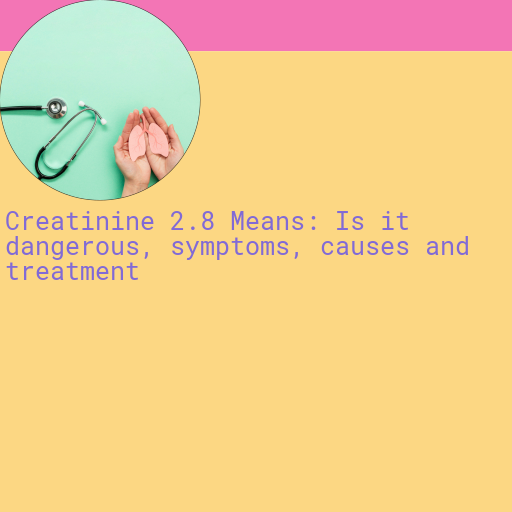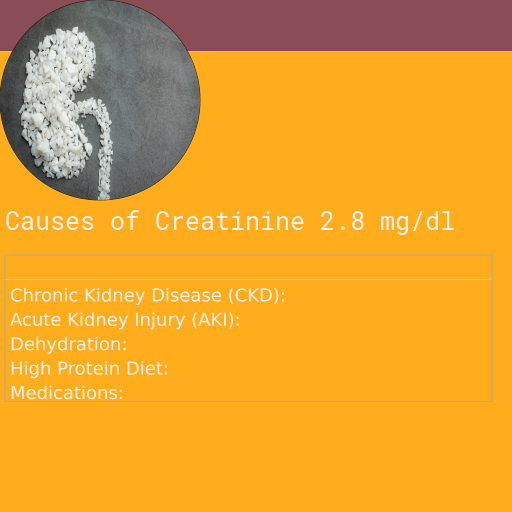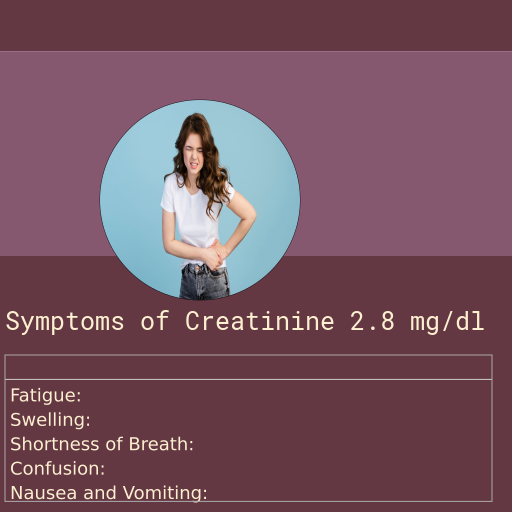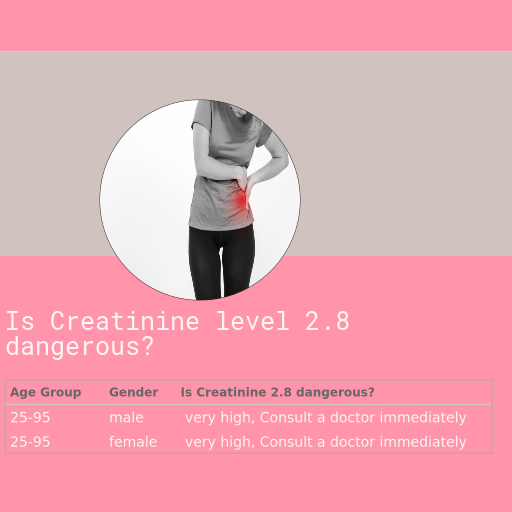Creatinine 2.8 : Is it Dangerous, Causes, Symptoms and More
Creatinine is a waste product that is produced by muscle metabolism and is typically filtered out of the blood by the kidneys. When you receive a lab result showing a creatinine level of 2.8, it can be a cause for concern. Elevated creatinine levels often indicate that the kidneys are not functioning properly. In this blog, we will explore the potential dangers associated with high creatinine levels, delve into the causes of this condition, and discuss the common symptoms you should look out for. Understanding these aspects is crucial for taking timely action and seeking appropriate treatment to safeguard your kidney health.

What is Creatinine
Creatinine is a byproduct of protein breakdown, specifically from muscle metabolism. As a waste product, it has no beneficial use in the body and must be effectively removed from the bloodstream. The kidneys play a crucial role in filtering creatinine out of the blood, ensuring it is excreted through urine. Elevated levels of creatinine can indicate potential kidney dysfunction or other underlying health issues, making it essential to monitor and manage appropriately.
- Muscle Metabolism: Creatinine is a byproduct of normal muscle metabolism. The more muscle mass a person has, the more creatinine they will produce.
- Dietary Intake: Consuming meat and other protein-rich foods can increase creatinine levels, as creatinine is also found in animal muscle tissue.
- Supplements: Certain supplements, especially those containing creatine, can elevate creatinine levels as the body converts creatine to creatinine.
- Medications: Some medications can affect kidney function, leading to increased creatinine levels. Always consult a healthcare provider regarding potential side effects.
- Kidney Function: The kidneys filter creatinine from the blood. Impaired kidney function can lead to higher creatinine levels in the bloodstream.
Normal Range of Creatinine in Adults
In adults, the normal range of creatinine levels can vary slightly depending on factors such as age, gender, and muscle mass. Generally, for adult males, the normal creatinine level is between 0.6 to 1.2 milligrams per deciliter (mg/dL), while for adult females, it is slightly lower, ranging from 0.5 to 1.1 mg/dL. These values are indicative of normal kidney function, as creatinine is a waste product that is filtered out of the blood by the kidneys. It's important to note that a significant deviation from this range could signal potential kidney issues and warrants further medical evaluation.
| Age Group | Normal Creatinine Range (mg/dL) |
|---|---|
| Infants (0-1 year) | 0.2 - 0.5 |
| Children (1-12 years) | 0.3 - 0.7 |
| Adolescents (13-18 years) | 0.5 - 1.0 |
| Adults (Male) | 0.6 - 1.2 |
| Adults (Female) | 0.5 - 1.1 |
| Older Adults (60+ years) | 0.6 - 1.3 |
Causes of Creatinine 2.8
Creatinine levels can become elevated due to various underlying health issues, and understanding these causes is crucial for proper treatment. Some common causes include kidney disease, where the kidneys are unable to efficiently filter waste from the blood, and conditions like dehydration or high blood pressure that put extra strain on the kidneys. Additionally, muscle injury or disorders can lead to increased creatinine production, as creatinine is a byproduct of muscle metabolism. It's essential to identify the root cause to manage elevated creatinine levels effectively.
- Chronic Kidney Disease (CKD): One of the most common causes of elevated creatinine levels is CKD, where the kidneys gradually lose their function over time.
- Acute Kidney Injury (AKI): Sudden damage to the kidneys, often due to severe dehydration, infection, or injury, can cause a spike in creatinine.
- Dehydration: Inadequate fluid intake can lead to decreased kidney function and elevated creatinine levels.
- High Protein Diet: Consuming large amounts of protein can cause a temporary rise in creatinine levels due to increased muscle metabolism.
- Medications: Certain drugs, such as nonsteroidal anti-inflammatory drugs (NSAIDs) and some antibiotics, can impair kidney function and raise creatinine levels.
- Diabetes: Poorly controlled diabetes can lead to diabetic nephropathy, a condition that damages the kidneys and increases creatinine levels.
- High Blood Pressure: Hypertension can damage blood vessels in the kidneys, leading to decreased kidney function and elevated creatinine.
- Urinary Tract Obstruction: Blockages in the urinary tract, such as kidney stones or an enlarged prostate, can lead to impaired kidney function and higher creatinine levels.

Symptoms of Creatinine 2.8
When creatinine levels rise, it can indicate underlying health issues that need immediate attention. Elevated creatinine is often a marker for kidney dysfunction, and it can manifest through various symptoms that should not be ignored. Common signs include fatigue, swelling in the extremities, and changes in urine output or color. Recognizing these symptoms early can be crucial for timely diagnosis and treatment.
- Fatigue: Feeling unusually tired and weak can be a sign of elevated creatinine levels.
- Swelling: Noticeable swelling in the face, hands, and feet might indicate kidney issues associated with high creatinine.
- Shortness of Breath: Difficulty breathing can occur due to fluid buildup in the lungs, a symptom of kidney dysfunction.
- Confusion: Elevated creatinine can affect cognitive functions, leading to confusion and difficulty concentrating.
- Nausea and Vomiting: Feeling nauseous or vomiting can be a result of toxins building up in the body due to poor kidney function.
- Muscle Cramps: Frequent muscle cramps or spasms may be indicative of electrolyte imbalances caused by high creatinine levels.
- Changes in Urine Output: Either a decrease or an increase in urine output can signal issues with kidney function.
- Chest Pain: Experiencing chest pain might be a severe symptom related to high creatinine and warrants immediate medical attention.

Dangers of Creatinine 2.8
Creatinine, a waste product generated from muscle metabolism, is usually filtered out by the kidneys and excreted in urine. While creatinine itself does not directly harm the body, elevated levels of creatinine in the blood can be a significant indicator of underlying issues, particularly kidney failure or other renal problems. High creatinine levels suggest that the kidneys are not functioning efficiently, leading to the accumulation of other harmful waste products, such as urea, in the body. These waste products can cause a range of adverse health effects, including fatigue, confusion, and even more serious complications if left untreated.
- Kidneys: Elevated creatinine levels can indicate kidney dysfunction or chronic kidney disease, impairing the kidneys' ability to filter waste from the blood.
- Heart: High creatinine can lead to cardiovascular complications such as hypertension and an increased risk of heart failure.
- Muscles: Increased creatinine levels may be a sign of muscle breakdown or rhabdomyolysis, a condition where damaged muscle tissue releases harmful substances into the bloodstream.
- Liver: Although less common, elevated creatinine can affect the liver, leading to conditions like hepatorenal syndrome, where liver failure impacts kidney function.
- Nervous System: High creatinine levels can cause neurological symptoms such as confusion, seizures, or even coma due to the accumulation of toxins.
- Digestive System: Elevated creatinine can contribute to gastrointestinal issues like nausea, vomiting, and loss of appetite.
- Circulatory System: Increased levels can lead to anemia because the kidneys produce erythropoietin, which is essential for red blood cell production.
- Immune System: High creatinine can weaken the immune system, making the body more susceptible to infections and other diseases.
Home remedies for Creatinine 2.8
Disclaimer: Elevated creatinine levels are a serious medical condition that cannot be adequately treated at home. It is crucial to seek professional medical advice to address the underlying causes. While awaiting medical consultation, basic supportive care can include staying well-hydrated, maintaining a balanced diet, and avoiding strenuous activities that may exacerbate the condition. However, these measures are not substitutes for professional care and should not be relied upon for treating elevated creatinine levels. Always consult with a healthcare provider for proper diagnosis and treatment.
- Hydrate Adequately: Ensure you drink plenty of water throughout the day to help your kidneys filter waste effectively. Aim for at least 8-10 glasses of water daily.
- Eat a Kidney-Friendly Diet: Focus on consuming foods that are low in sodium, phosphorus, and potassium. Incorporate fresh fruits and vegetables while avoiding processed foods.
- Avoid Over-the-Counter Medications: Steer clear of non-prescription medications like NSAIDs (ibuprofen, aspirin, etc.) as they can further strain your kidneys.
- Monitor Blood Pressure: Keep an eye on your blood pressure levels, as high blood pressure can exacerbate kidney issues. Use a home blood pressure monitor if necessary.
- Exercise Regularly: Engage in moderate physical activity like walking, yoga, or swimming to maintain overall health and support kidney function. Aim for at least 30 minutes a day, five days a week.
Treatment for Creatinine 2.8
When dealing with a creatinine level of 2.8, it is imperative to seek medical treatment from a qualified doctor. The primary treatment goals include stabilizing kidney function, stopping any potentially harmful drugs, and treating underlying infections that may be contributing to elevated creatinine levels. A healthcare provider will tailor a specific treatment plan to address these issues, aiming to prevent further kidney damage and improve overall health. Regular monitoring and follow-up are crucial to ensure that the treatment is effective and to make any necessary adjustments.
- Medication Adjustment: Doctors may adjust or prescribe medications that help in reducing high creatinine levels and managing underlying conditions.
- Dietary Changes: A low-protein diet may be recommended to reduce the workload on the kidneys, along with a diet low in potassium and phosphorus.
- Hydration: Ensuring adequate fluid intake can help flush out excess creatinine, but it's important to follow a doctor's advice on the right amount.
- Treating Underlying Conditions: Managing conditions like diabetes and high blood pressure effectively can help prevent further kidney damage.
- Dialysis: In severe cases, dialysis may be necessary to artificially remove waste products from the blood, including creatinine.
GFR with Creatinine of 2.8
When discussing kidney health, it's essential to understand the concept of Glomerular Filtration Rate (GFR). GFR is a measure of how well your kidneys are filtering waste from your blood, providing a more accurate picture of kidney function than an absolute creatinine value. While a creatinine level of 2.8 may seem alarming, it doesn't offer the full story. The GFR takes into account factors such as age, sex, and body size, making it a more reliable indicator of kidney health. Thus, while elevated creatinine levels can signal an issue, the GFR provides a comprehensive assessment, allowing for more targeted and effective treatment plans.
| Grade | GFR (ml/min/1.73m²) | What It Means |
|---|---|---|
| G1 | ≥ 90 | Normal or high GFR. Kidney function is normal. |
| G2 | 60-89 | Mildly decreased GFR. Kidney function is slightly reduced. |
| G3a | 45-59 | Mild to moderately decreased GFR. |
| G3b | 30-44 | Moderately to severely decreased GFR. |
| G4 | 15-29 | Severely decreased GFR. Significant reduction in kidney function. |
| G5 | < 15 | Kidney failure. Requires dialysis or transplant. |
What is my GFR for a creatinine of 2.8
| Age | Gender | GFR |
|---|---|---|
| 18 | male | 29.66 ml/m2 |
| 45 | male | 24.63 ml/m2 |
| 60 | male | 23.23 ml/m2 |
| 80 | male | 21.91 ml/m2 |
| 18 | female | 22.01 ml/m2 |
| 45 | female | 18.27 ml/m2 |
| 60 | female | 17.24 ml/m2 |
| 80 | female | 16.26 ml/m2 |
Table of danger posed by Creatinine 2.8 in male across different ages
| Age Group | Is Creatinne of 2.8 dangerous? |
|---|---|
| 25yrs - 95 yrs | very high, Consult a doctor immediately |
Table of danger posed by Creatinine 2.8 in female across different ages
| Age Group | Is Creatinne of 2.8 dangerous? |
|---|---|
| 25yrs - 95 yrs | very high, Consult a doctor immediately |

Which other tests should be done for a creatinine value of 2.8?
In addition to measuring creatinine levels, doctors often recommend a comprehensive evaluation through other tests such as electrolytes, renal profile, and blood gas levels to gain a full picture of kidney function and overall health. These tests can help identify imbalances in essential minerals, assess kidney performance more broadly, and detect any issues with acid-base balance in the blood. By combining these results with creatinine measurements, healthcare providers can develop a more accurate diagnosis and tailor treatment plans effectively, ensuring that any underlying conditions are properly managed.
- Electrolytes: This test measures levels of essential minerals such as sodium, potassium, and chloride in your blood. Imbalances can indicate kidney dysfunction or other metabolic issues.
- Renal Profile: A comprehensive set of tests that assess kidney function, including blood urea nitrogen (BUN) and glomerular filtration rate (GFR), offering a more detailed picture of renal health.
- Blood Gas Levels: This test evaluates the oxygen and carbon dioxide levels in your blood, as well as the blood's pH. It helps in understanding how well your lungs and kidneys are managing acid-base balance.
- HbA1c: Hemoglobin A1c measures your average blood sugar levels over the past two to three months. High levels can indicate poorly controlled diabetes, which can affect kidney function.
- Liver Enzymes: Tests like ALT and AST measure enzyme levels in the liver. Elevated levels can indicate liver damage, which can have a cascading effect on kidney function.
- LDH (Lactate Dehydrogenase): This enzyme is found in many body tissues, including the heart, liver, and kidneys. High levels can indicate tissue damage and help in diagnosing conditions related to kidney health.
- Urea: Measuring blood urea nitrogen (BUN) helps in assessing how well your kidneys are removing waste products from the blood. Elevated levels can indicate impaired kidney function.

 By: Dr.Bhargav Raut
By: Dr.Bhargav Raut